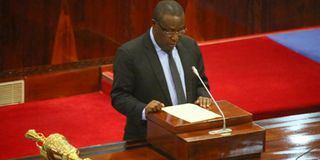MPs want trickle-down of levy abolition

Minister for Agriculture, Livestock and Fisheries, Dr Charles Tizeba
What you need to know:
On Friday the Minister for Agriculture, Livestock and Fisheries, Dr Charles Tizeba, announced in Parliament as he was tabling his ministry’s budget for the 2017/18 financial year the scrapping of 108 levies, saying they were preventing fishermen, livestock keepers and farmers from making maximum profit from their produce.
Dodoma. Debate raged yesterday on the significance of abolition of over 100 levies in the agriculture, livestock and fisheries sectors.
On Friday the Minister for Agriculture, Livestock and Fisheries, Dr Charles Tizeba, announced in Parliament as he was tabling his ministry’s budget for the 2017/18 financial year the scrapping of 108 levies, saying they were preventing fishermen, livestock keepers and farmers from making maximum profit from their produce.
Debating the budget yesterday, Mr David Silinde (Momba-Chadema) said the majority of the scrapped levies would benefit traders and middlemen, but not small-scale farmers who comprise the bulk of the country’s population.
“The beneficiaries of all 16 abolished levies in the sugar sub-sector are traders and manufacturers...there’s nowhere sugarcane farmers are covered. As for tobacco, only two levies out of the ten scrapped charges will benefit farmers. This is also the case with coffee where 17 levies have been scrapped, but only two will benefit farmers,” noted Mr Silinde.
He also said even in cashew nuts, the two scrapped levies are also going to benefit traders.
“They are doing away with a license fee of $1,000 for buying cashew nuts. Is that really what cashew nut farmers have been striving for all these years? The same goes for all farmers in the country who are yearning for agriculture inputs, credits to boost their farming and strong and reliable market for their produces.”
Mr Sixtus Mapunda (Mbinga Urban-CCM), however, differed with Mr Silinde, noting that due to a chain of levies, farmers across the country were selling their crops at low price.
“Now with the levies scrapped, the government should set a indicative prices for the crops so that the farmers can get what they really deserve, and all queries raised by Mr Silinde would be automatically solved. But as the parliamentary committee (on agriculture, livestock and water) rightly put it, agriculture is not our main priority as a country.”
Mr Njalu Silanga (Itilima-CCM) concurred with Mr Mapunda, noting that traders were smart enough to ensure that they were not making loss and therefore the entire burden of levies was placed onto poor farmers.
“Now a substantial part of cost of business for traders has been scrapped and they have no choice but to buy crops at a reasonable price that would be beneficial to our farmers,” he said.
Some MPs also underscored the importance of more investment in science and technology in agriculture in a bid to strengthen the country’s capacity in researches to develop the sector.
Those who spoke about agricultural research expressed their dissatisfaction with priority given to that area, which they believe that was one of the things that would help increase the production.
Ms Mariam Ditopile (Special Seats-CCM) stressed the importance of science and technology in agriculture, saying the country had not yet opened the doors enough to boost the agriculture.
She cited as an example coffee production, saying many farmers still depend on the aged seedlings which have now become “dormant.”
Mr Ally Saleh (Malindi-CUF) said the country was in need of ideological changes to boost agriculture.
He noted that with all the potential that agriculture has to transform the economy, receiving only three per cent of its development budget indicates that the country is stuck and new thinking is required.
We are the third country in Africa when it comes to the number of livestock. We have almost double the size of livestock compared to Kenya, but our neighbours in making dairy products,” said Mr Saleh. “We have an advantage in all areas, millions of acres of arable land and a long coastline, but 53 three years down the line we still have traditional farming and fishing.”




